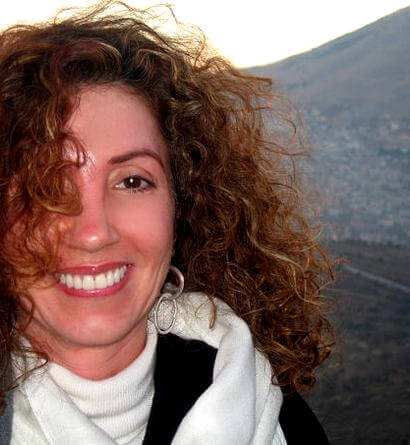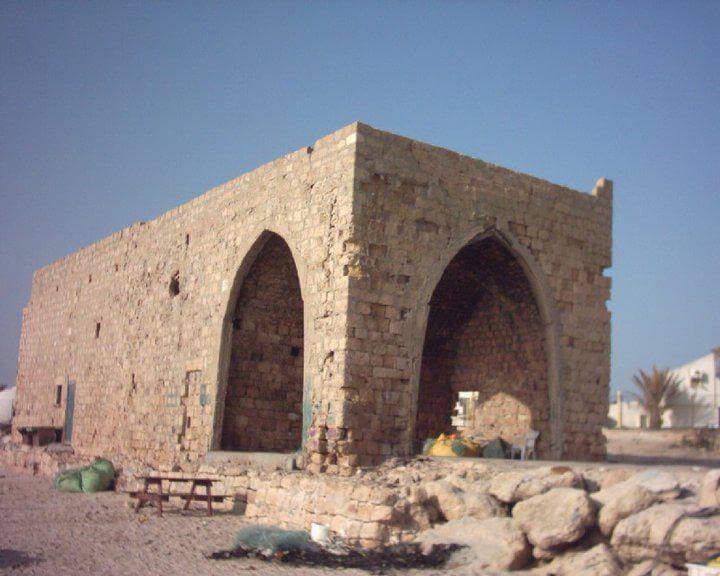
Tantura was a beautiful Palestinian fishing village 15 miles south of Haifa (pop. 1,700). In the early hours of May 23, 1948 it was attacked and occupied by the Alexandroni (Third) Brigade of the Haganah (32nd Battalion). Over 200 villagers, mostly unarmed young men, were massacred; others were taken prisoner and put to forced labor. Most of the survivors ended up in refugee camps in neighboring countries. Only one house was left partly standing. In June 1948 a kibbutz was established in the deserted village.
Hala Gabriel is a Palestinian-American filmmaker, a graduate of the California Institute of Arts and winner of the Silver Award of the International Houston Film Festival. She was born as a refugee to parents who had fled from Tantura (the house left partly standing had belonged to her family). She spent her earliest years in various places in Syria and was still a young child when her parents immigrated with her to the United States.
In 2010, on her second attempt, Hala managed to enter Israel and visit the site of her ancestral village. She also met relatives who had taken refuge in the nearby village of Fureidis, which had escaped destruction, and interviewed three of the men who had participated in the attack on Tantura. The title of the documentary on which she is working, Road to Tantura, refers to this journey.
The site of the village is now a beach resort. The mass grave in which the victims of the massacre are buried is covered by a parking lot.
Hala, as a child you must have heard a lot from your parents about Tantura and what happened to its inhabitants.

HG: No, my parents never reminisced about life in Tantura. Only once did my father remark that Tantura was very beautiful. On another occasion I asked him: “Why don’t we go back?” “We are not allowed to go back,” he replied and then walked away and closed the door. I never brought the subject up again. I understood there was something painful in his past that he very much wanted to forget.
After coming to America my parents insisted that we become just like other Americans. We spoke English, ate macaroni and cheese, and decorated Christmas trees even though we were not Christian. I knew we were Palestinians. I knew we were refugees. But I didn’t really understand what that meant.
How then did you eventually come to understand?
HG: To learn more about my family history I used the internet. My first search yielded nothing, but after 9/11 I tried again and found a news story about the Israeli scholar Teddy Katz, who had written a master’s thesis on what had happened at Tantura. After his findings were summarized in an article in the newspaper Ma’ariv a group of veterans from the Alexandroni Brigade sued him for libel.
This article mentioned a memoir written in 1950 by a Palestinian from Tantura named Marwan Yahya. That was my father! So I found Teddy’s e-mail address, wrote and introduced myself as Marwan Yahya’s daughter, and asked him for a copy of my father’s memoir. I met Teddy when he visited Los Angeles to speak at local universities. It was Teddy who urged me to go to Syria and interview survivors from Tantura in the Yarmouk refugee camp. A few years later I had the opportunity to do that. It was the beginning of my work on the documentary.

And then in 2010 you finally managed to enter Israel and travel to Tantura…
HG: I was held at the airport for eight hours and repeatedly interrogated. Fortunately I had the idea to call Teddy, who arranged for a member of the Knesset to call the airport and persuade them to allow me to enter.
So I was able to see with my own eyes what remained of Tantura – the ruin of my family’s house. On one wall I found a poem that my great-grandfather Mahmoud Yahya had carved there when he built the house in 1878. And I met some distant relatives from a neighboring village – one of the few Palestinian villages that remained after the Nakba.
You also found and interviewed several soldiers who participated in the attack on Tantura. What was their attitude? Did they express regret for what they had done?
HG: Benz Pridan, the commander who led the attack, said that if he had caused harm to me and my family then he apologized. That if got me quite upset. How could he doubt it? My encounters with the soldiers were the most distressing part of the trip. For months afterward I was plagued by nightmares.

What impression did you form of the situation of the Palestinian citizens of Israel?
HG: The Palestinians I met live in constant fear. None of them dared speak to me of their lives in front of the camera. One had spent two and a half years in prison for throwing a stone at the age of twelve. And I noticed that most of the Palestinian villages in Israel are sealed off with high walls, like prisons.
What further work is needed to complete your documentary?
HG: On account of the civil war in Syria refugees have been transferred from Yarmouk to new refugee camps in Jordan and I plan to conduct interviews there. I also want to place the story of Tantura in the broader context of the Nakba as a whole. From November I shall be working with a documentary film editor named Rabab Haj Yahya – she was the editor of Speed Sisters, a film about women who race cars in the West Bank.
People can learn more about the background to my work, view existing segments of film, and make donations at the website. I would greatly appreciate any help in defraying the costs of completing and launching the documentary.



while it is certain that the residents if Tantura were displaced and that there was a battle there on the previous days of 5-21, 5-22 there has never been any actual proof of any massacre. Especially the most outrageous claims of lining up and shooting (specifically contradicted by authors own witnesses] and the idea of forced labour of prisoners is a wild exaggeration of the condition of Arab prisoners designed to specifically equate with a brutal army from ww2 for propaganda purposes. The student (he was almost 60 yrs old) Katz that presented this thesis of massacre was discredited in both lower and higher Israeli courts as well as in public. It was proven that he lied about his interviews after he was forced to produce his tapes and he publicly apologized before the court then-a day later retracted his retraction. That his biggest (and for the most part, sole) supporter was Pappe is hardly a surprise.)
Anyway-the village of Tantura can still be honoured and remembered for the villagers that once had lives there. The victims of the battle that took place there-wether it was unbalanced by better equipped Haganah does not refute that there was a battle. That the villagers were helping to supply the Arab armies by smuggling supplies and trying to cut off the Tel-Aviv access highway is a normal response to a people either forced or who chose to engage the new Israeli State to keep their land.
But the idea of ‘massacre’ will forever be disputed by historians both pro-Israel and anti-Zionist as well as many neutral academics who study the regions history and draw their own conclusions. And it is not a denial of nakbah to dispute a highly suspect ‘thesis’ by a discredited Israeli grad student [Katz] -unless of course one is going to play the ‘conspiracy’ game and assume that all the Israeli court decisions were somehow corrupted or unfair. Then-there is nothing to dispute. If you believe its all a lie-then a ‘true-believer’ is the moniker that should be applied.
However- that Tantura will continue to be memorialized and mourned as a loss for its former residents and their descendants is a natural outpour of remembrance -some both peoples in the i/p conflict know a lot about.
” Over 200 villagers, mostly unarmed young men, were massacred ”
Please proffer your evidence.
These events were thoroughly investigated in the MA thesis of Teddy Katz and summarized in an article in Ma’ariv. See Zalman Amit, “Tantura, Teddy Katz, and Haifa University,” Counterpunch, May 11, 2005 (http://www.counterpunch.org/2005/05/11/tantura-teddy-katz-and-haifa-university/).
As Hala notes, Katz was sued by veterans of the Alexandroni Brigade. Under intense pressure he was persuaded to sign a retraction, but under the circumstances there is no justification for taking the retraction as evidence against the validity of his research.
See also the collection of 21 eyewitness testimonies on the “Palestine Remembered” website (http://www.palestineremembered.com/Haifa/al-Tantura/Story560.html).
Yet another couple of Nakba-doubters! Just like the Holocaust doubters…
Do you think the Palestinians left Tantura voluntarily??
Do I think that Israeli court decisions were “somehow corrupted or unfair”?
Indeed I do. The courts are part of the network of control over the “inferior” Palestinians.
I have read FInkelstein’s book, Beyond Chutzpah, and it’s VERY convincing.
The structure is beautiful and haunting.out of arabian legends .It looks out of place.sad yet proud .I fished many times of the rocks.I’ll be doing the same in sept.Beautiful beach.Once an arabian horse came prancing on the beach down from fureidis.He left a calling card.